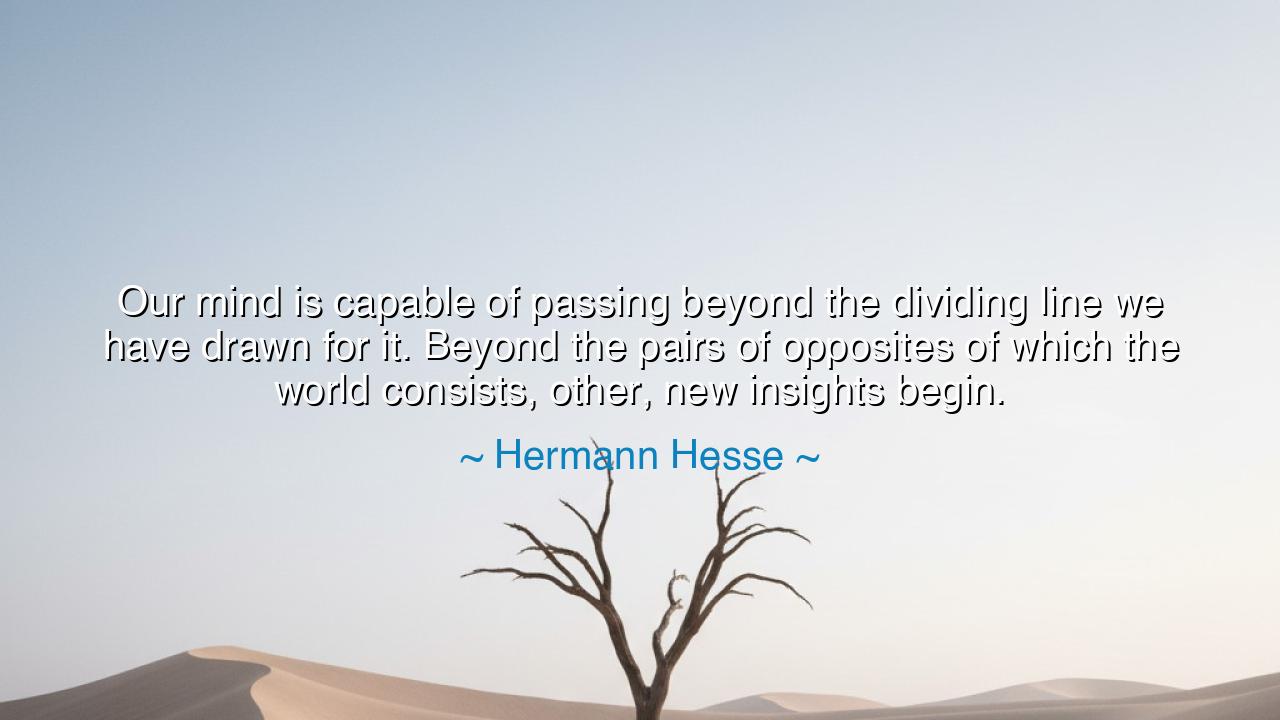
Our mind is capable of passing beyond the dividing line we have
Our mind is capable of passing beyond the dividing line we have drawn for it. Beyond the pairs of opposites of which the world consists, other, new insights begin.






“Our mind is capable of passing beyond the dividing line we have drawn for it. Beyond the pairs of opposites of which the world consists, other, new insights begin.” — Thus wrote Hermann Hesse, the mystic philosopher and poet of the human spirit, whose works explored the sacred tension between the soul’s longing and the world’s illusions. In these luminous words, Hesse reveals the secret of inner transcendence — that the mind, when freed from its own boundaries, can pierce through the veil of duality, entering a realm where wisdom is no longer divided into “this” or “that,” “good” or “evil,” “light” or “darkness.” He speaks of the awakening that lies beyond thought itself, beyond the pairs of opposites that chain the human understanding.
Hesse was no stranger to this inner journey. In his novels — Siddhartha, Demian, Steppenwolf — he portrayed the eternal conflict within man: the war between body and spirit, reason and passion, self and world. From this struggle emerged his insight that true wisdom is not found in choosing one side over the other, but in transcending both. The mind, he says, is capable of rising beyond its own self-imposed limits — of perceiving the unity behind all apparent contradictions. For only when we pass beyond the world of opposites do we begin to see life as it truly is: whole, flowing, indivisible.
To understand this truth, one must first see how man imprisons himself within duality. We divide the world into “success” and “failure,” “beautiful” and “ugly,” “right” and “wrong.” We live in constant conflict between desire and fear, pride and shame, light and shadow. These opposites create movement and meaning — but they also bind us. The mind, trained to compare, to judge, to name, loses the greater vision. It cannot see that the opposites are merely two faces of one truth — that joy and sorrow, gain and loss, life and death, are woven together in the same eternal fabric. Hesse reminds us that enlightenment begins when the mind ceases to divide, when it learns to see beyond contradiction.
Consider the story of Siddhartha Gautama, the Buddha — a figure Hesse himself immortalized in his writing. The young prince lived first in luxury, then in ascetic pain, seeking truth through opposites. But it was only when he abandoned both extremes — when he sat silently beneath the Bodhi tree and looked inward without clinging or rejecting — that he awakened. He saw that duality is illusion, that all things arise and pass away together, bound by the same current of being. In that moment, he transcended the mind’s dividing line and entered the stillness beyond opposites — the peace Hesse calls “new insight.”
This transcendence is not a denial of life, but its fulfillment. For when the mind passes beyond duality, it no longer fears pain nor clings to pleasure; it sees them both as part of the same divine play. To live thus is to walk freely, to act without attachment, to love without condition. Such a state is not the numbness of indifference, but the clarity of understanding — a vision of the whole where others see fragments. The mind, once liberated, becomes a mirror reflecting all things without distortion.
And yet, Hesse’s teaching is not easy. To pass beyond opposites demands discipline and awareness. The world will always tempt us to take sides, to declare one thing good and its opposite evil. But the wise learn to dwell at the center, the still point between extremes. They do not reject the opposites; they hold them both in understanding. They learn that love and loss, joy and sorrow, creation and destruction are not enemies, but companions in the dance of existence.
The lesson, then, is this: free your mind from its narrow judgments. Observe life not through the lens of “either/or,” but through the quiet gaze of “both/and.” When conflict arises, seek the unity beneath it. When confusion clouds your heart, remember that the mind is vast enough to hold contradiction. Sit in stillness; watch the opposites dissolve into the greater harmony that gives them birth.
So let us remember the wisdom of Hermann Hesse: “Beyond the pairs of opposites of which the world consists, other, new insights begin.” Do not fear paradox; it is the doorway to truth. Go beyond the dividing line you have drawn — beyond the limits of thought, beyond the illusions of good and evil — and there, in the silence beyond duality, you will glimpse the eternal. For in that sacred space, where opposites meet and dissolve, the soul awakens to its highest understanding: that all is one, and that unity is the beginning of true insight.






AAdministratorAdministrator
Welcome, honored guests. Please leave a comment, we will respond soon